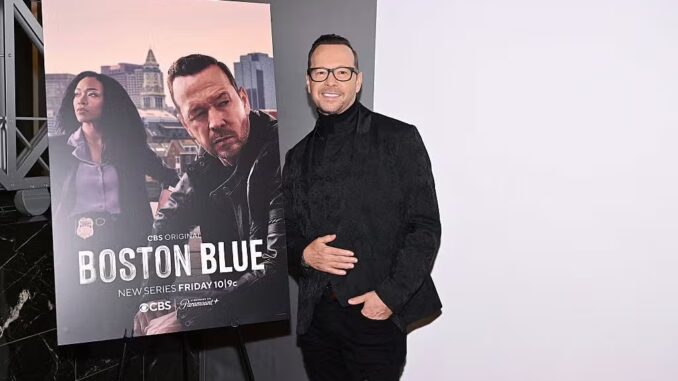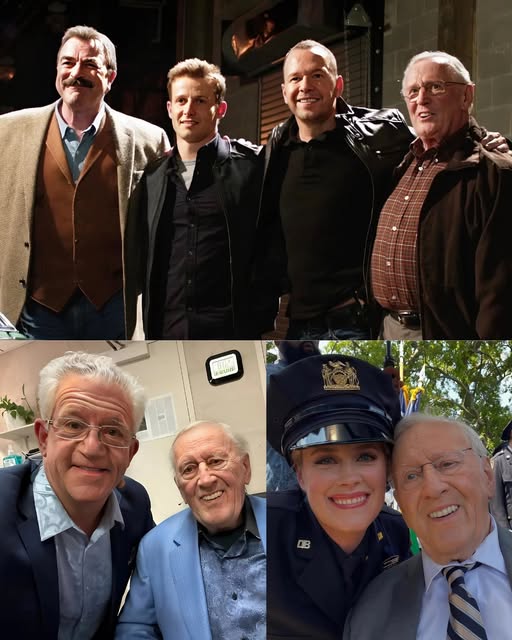
Fans of Boston Blue, the hit spinoff of Blue Bloods, have noticed something different this season — and it’s not just the pulse-pounding cases or the clever plot twists. The show’s latest storyline delves deep into the complex and often emotional relationship between Danny Reagan, played by Donnie Wahlberg, and his on-screen son. Following a recent recast of the character, the writers and cast have leaned into this tension, crafting a story that feels both authentic and compelling.
Recasting a character, especially one that holds a central role in a family dynamic, is always a challenge for television. In Boston Blue, the change was handled with sensitivity, yet it inevitably altered the chemistry between Danny Reagan and his son. Fans have commented on social media about the slight differences in their interactions — some subtle, some more pronounced — and these shifts are not coincidental. The showrunners intentionally wrote these changes into the storyline to explore the natural adjustments that occur when family dynamics are disrupted.
Exploring Father-Son Struggles
Danny Reagan’s character has always been portrayed as a devoted, yet sometimes complicated, father. The recast provided an opportunity to examine the nuances of father-son relationships under stress. Season 1, Episode 4, for instance, showcases a poignant scene where Danny struggles to connect with his son after a challenging case leaves him emotionally drained. The dialogue is layered, capturing the frustration, pride, and love that coexist in familial bonds.
Donnie Wahlberg has openly discussed the difficulty and rewards of portraying a father navigating a changing family dynamic. In interviews, he emphasized that the recast allowed for a fresh perspective: “It’s a chance to explore Danny’s vulnerability in ways we haven’t before. It’s tough, sure, but it brings a lot of authenticity to the screen.” This vulnerability resonates with viewers, many of whom have shared personal stories about fatherhood, reconciliation, and communication challenges.
The Art of Recasting
Recasting is a delicate art in television. The new actor stepping into the role must balance respect for the character’s established traits while bringing their own interpretation. The production team behind Boston Blue made sure the transition felt organic. Several episodes include subtle acknowledgments of the character’s change, weaving it into the storyline rather than ignoring it. This approach not only maintains continuity but also mirrors real-life experiences, where relationships evolve over time due to circumstances beyond anyone’s control.
Writers have skillfully used this recast to add depth to the father-son relationship. In one storyline, Danny’s son begins to question his father’s decisions, reflecting both teenage rebellion and the adjustment to a new parental figure on screen. The resulting tension drives the plot while providing emotional heft, allowing audiences to see a more multidimensional side of Danny Reagan.
Fan Reactions and Social Media Buzz
Fans have had strong reactions to the recast, with discussions trending across Twitter, Instagram, and fan forums. Some viewers initially expressed hesitation, missing the original actor’s portrayal, while others praised the show for tackling the complexity of the father-son relationship head-on. Hashtags like #BostonBlueFamily and #DannyAndSon have been trending as fans dissect every episode, scene by scene.
Critics have also noted that the recast may have unintentionally added realism to the show. Life is rarely static, and family dynamics change over time — a nuance that some reviewers feel Boston Blue has captured exceptionally well. One review on TVLine praised the writers: “The show doesn’t shy away from the awkwardness and tension that comes with change. It’s raw, it’s real, and it makes for some of the most compelling father-son moments in recent television history.”
Behind the Scenes: Cast Perspectives
Donnie Wahlberg isn’t the only actor adjusting to the new dynamic. The rest of the cast has commented on how the recast required them to recalibrate their own performances. Scenes that once relied on established chemistry had to be re-explored, which, according to Wahlberg, became an opportunity for creativity: “We got to discover the nuances all over again. It keeps the energy fresh and the performances honest.”
Producers also recognized that the recast could serve as a storytelling tool rather than a disruption. By acknowledging the change through dialogue and subtle interactions, the writers reinforced the authenticity of the Reagan family’s experiences. In several episodes, the tension between Danny and his son mirrors universal themes: coping with change, asserting independence, and rebuilding trust — elements that resonate far beyond the screen.

Themes of Reconciliation and Growth
At its core, Boston Blue is more than a procedural; it’s a character-driven narrative that explores human relationships under pressure. The strained father-son storyline highlights the universal struggle of balancing professional obligations with personal connections. Danny Reagan, a dedicated detective, must reconcile his demanding career with the emotional needs of his son. This balancing act provides a rich backdrop for storytelling, giving audiences both thrilling cases and heartfelt family moments.
Episodes focusing on reconciliation have been particularly impactful. Viewers have praised scenes where Danny takes deliberate steps to connect with his son — whether through shared hobbies, heartfelt conversations, or moments of quiet understanding. These interactions not only deepen the emotional resonance of the show but also illustrate the writers’ commitment to portraying a realistic father-son relationship.
Looking Ahead
As Boston Blue continues its first season, fans are eager to see how this storyline evolves. Will Danny and his son bridge the gap created by the recast? How will their relationship affect broader narrative arcs, including professional challenges and other family dynamics? The writers have hinted that more emotional payoffs are coming, promising viewers a blend of procedural tension and personal growth that keeps the show engaging and unpredictable.
The recast, once seen as a potential hurdle, has now become a catalyst for deeper storytelling. By embracing the tension, Boston Blue has not only preserved its narrative integrity but also enriched its exploration of family, loyalty, and resilience. Fans, critics, and casual viewers alike are responding positively to this approach, making the show a standout in the current television landscape.
Conclusion
In many ways, the recast in Boston Blue serves as a mirror for life itself: relationships shift, people grow, and change is inevitable. Rather than ignoring these realities, the show has leaned into them, creating a layered, emotionally engaging father-son storyline that is resonating with audiences worldwide. Donnie Wahlberg’s portrayal of Danny Reagan, combined with the new actor’s performance as his son, offers viewers both drama and authenticity — a testament to the creative team’s skill and vision.
As the season unfolds, the tension, the reconciliations, and the emotional stakes promise to keep fans on the edge of their seats. Boston Blue proves that even after a recast, a show can thrive — and sometimes, the challenges behind the scenes make the story on screen even more compelling. For fans invested in Danny Reagan and his family, the journey has only just begun.